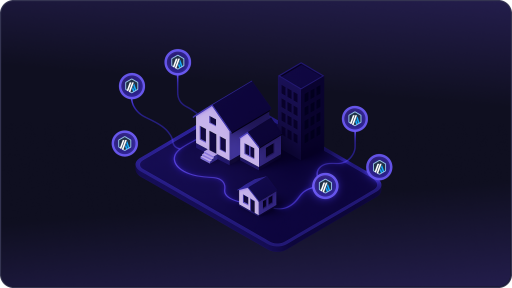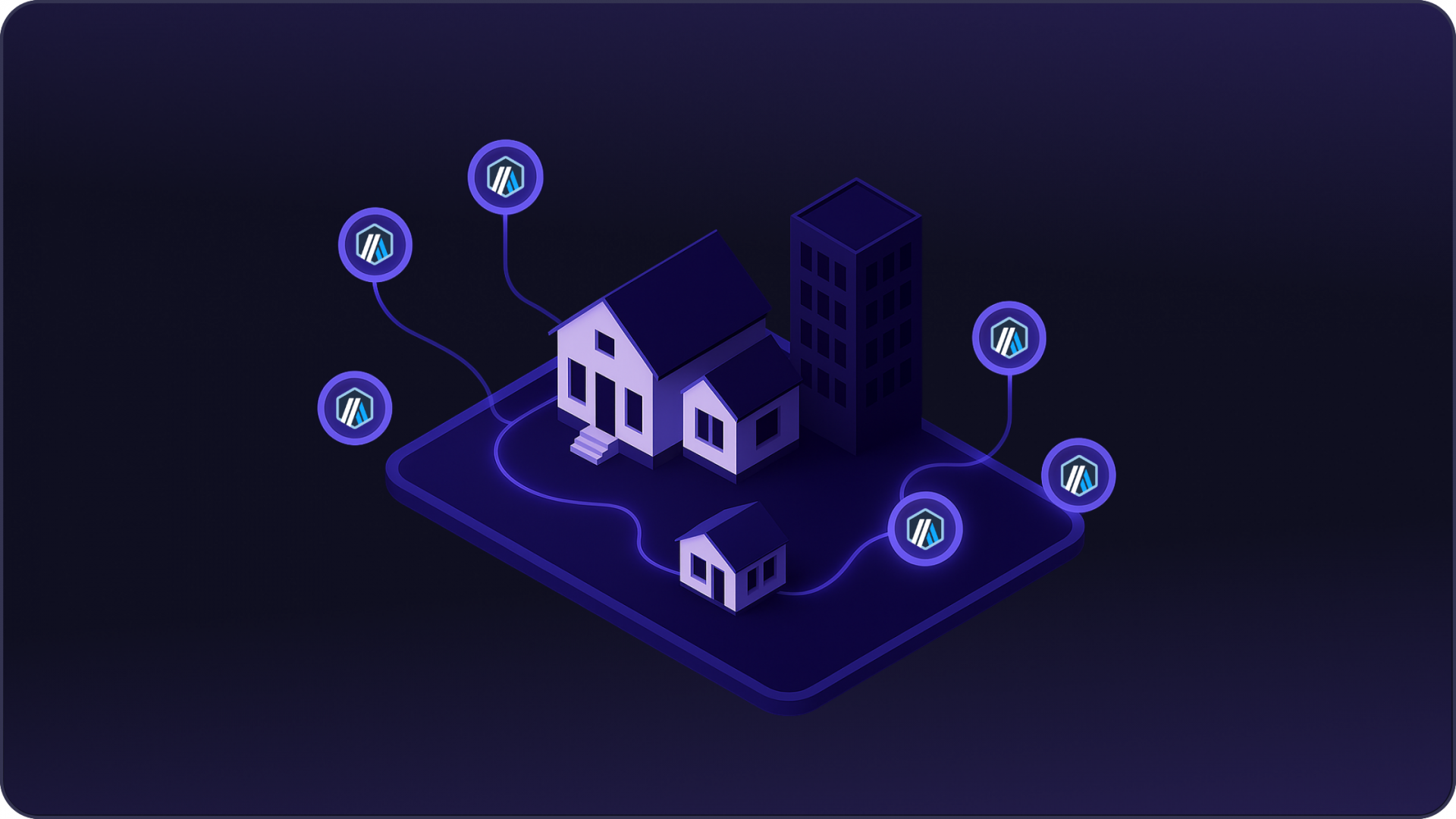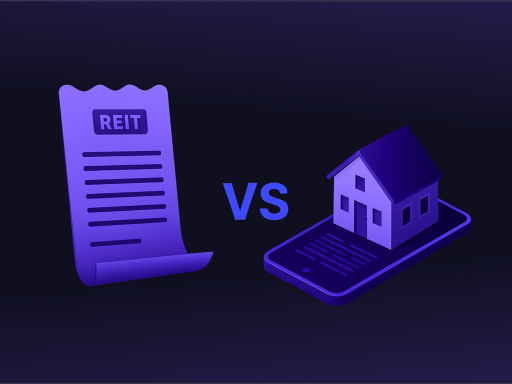Introduction
For decades, real estate has been one of the most proven ways to build wealth. It creates steady income and long-term security. But access has always been the problem. Buying a home requires large capital. Selling it takes months. And investing across borders is almost impossible for ordinary people.
At the same time, millions of people are turning to crypto. They are looking for passive income, but most tokens they buy only rise and fall with hype. The result is more stress, not more freedom.
Real estate on Arbitrum changes that. It takes the world’s most reliable asset class and places it on one of the fastest growing blockchains. Properties are tokenized into fractions. Rent is paid in USDC each month, visible directly onchain. Ownership is secured through a legal trust model. And entry is simple, starting from 250 dollars.
This shift matters because it brings real income to the same wallets that once only held speculative assets. Instead of chasing gains, investors can now collect rent from homes, Airbnbs, and residential properties in strong markets. Arbitrum makes it efficient with low fees, fast settlement, and Ethereum-level security.
Real estate has always been about patience and scale. Onchain, it becomes accessible and global. That combination is powerful for anyone tired of depending only on their salary or risky trades.
Key Highlights
- Real estate is proven, but hard to access.
- Tokenization on Arbitrum makes it simple, fast, and global.
- Investors can start with 250 dollars and own a share of a property.
- Monthly rent is paid in USDC, visible and traceable onchain.
- Arbitrum provides speed, low cost, and the security of Ethereum.
The problem with traditional real estate
Real estate has always been seen as the safest way to build long-term wealth. But the barriers make it difficult for most people to even start.
The first challenge is cost. Buying a home requires a large amount of capital. In many countries, property prices are far beyond what an average worker can afford. Even saving for years may not be enough.
The second challenge is time. Selling a property can take months. Paperwork, agents, and negotiations slow everything down. Unlike stocks or crypto, you cannot move in and out quickly. That makes real estate less flexible when you need liquidity.
Borders are another problem. If you live in one country, buying property in another usually means dealing with lawyers, visas, and heavy restrictions. The best markets stay closed to most of the world.
Then there are the middlemen. Brokers, agents, banks, and managers all take their share. By the time rent or returns reach you, a large part of the income is gone. On top of that, hidden costs like repairs or renovation can eat into profit even more.
For many, the dream of owning property ends there. The money, time, and complexity push them back into trading, saving, or chasing risky assets. Real estate keeps its reputation as stable and rewarding, but only for the few who can get past the barriers.
Why tokenization solves this
Tokenization changes the way people access real estate. Instead of needing huge capital, you can start with a fraction of a property. On Estate Protocol, the entry is 250 dollars. That lowers the barrier and allows anyone to own a share of income-generating assets such as Airbnb and real estate on Arbitrum.
Liquidity is another major improvement. A traditional property takes months to sell. Tokenized shares can be sold onchain whenever there is demand. That means investors are not locked in for years. They can choose to hold, sell, or increase their share as they like.
Borders are no longer a problem. A worker in one country can co-own property in another without leaving home. There are no banks to deal with, no extra legal hurdles, and no restrictions tied to nationality.
Income becomes more direct. Rent is collected and paid monthly in USDC. There are no brokers or middlemen clipping the payout along the way. Each investor receives their share in full, visible directly in their wallet.
Ownership is also secured through a legal trust model. That ensures investors are not just buying exposure to a platform. They hold a legal claim to the property, backed by documents and fully transparent onchain records.
Tokenization removes the cost, delay, and complexity that kept most people out. It keeps what makes real estate valuable which is stability, yield, and growth, all while stripping away the friction.
Why Arbitrum specifically
Arbitrum is one of the most widely used Ethereum layer two networks. It combines the security of Ethereum with faster and cheaper transactions. For tokenized real estate, this balance is important. Investors need trust in the chain, but they also need efficiency when moving in and out of assets.
Low fees make it practical to invest with smaller amounts. On mainnet, gas costs could be higher than the investment itself. On Arbitrum, transactions remain affordable, which is key when entry starts at 250 dollars.
Speed is another advantage. Rent distributions, token transfers, and property updates can all be handled quickly. Investors do not wait hours for settlement. Their income and ownership updates show up almost instantly.
Arbitrum has also become a hub for real world assets. More protocols are choosing it as the home for tokenization. That creates a strong ecosystem where investors can diversify, connect with other DeFi tools, and manage their portfolios without leaving the chain.
Community adoption adds another layer of strength. Arbitrum has one of the largest user bases among layer two networks. That means more liquidity, more integrations, and a stable foundation for long-term growth.
For real estate, stability matters. Combining a proven asset class with a chain trusted by millions of users gives investors confidence that their holdings are both secure and accessible. Some US Airbnbs have already been tokenized on Arbitrum. These are revenue generating properties.
How real estate works on Arbitrum
The process is designed to be simple. It takes what normally requires months of paperwork and condenses it into a few clear steps.
First, you connect a wallet on Arbitrum. That becomes your account, your record of ownership, and the place where rent is paid.
Second, you choose a property from the marketplace. Each listing has full details of documents, yield history, and property specifics. You decide how much to invest. Entry starts at 250 dollars.
Third, when you buy tokens, you own a fraction of that property. The tokens are tied to a legal trust structure that secures your rights. This is not exposure or speculation. It is ownership backed by law.
Fourth, you begin receiving rent. Each month, your share of income is distributed in USDC. It arrives directly in your wallet, fully visible onchain.
Finally, you can decide what to do with your tokens. Hold your real estate on Arbitrum for steady rent. Sell them to another investor. Or increase your position in new properties. The flexibility is built in.
The entire flow is quick and transparent. There are no brokers, no middlemen, and no delays. Every action is recorded onchain, giving you clarity and control that traditional real estate never could.
Benefits for investors
Real estate on Arbitrum gives investors something they rarely get in other markets. Predictability and access.
You no longer need large savings to start. With 250 dollars you can own a share of a property that pays rent every month. That opens the door for anyone who wants passive income without waiting decades to buy a home.
The returns are not built on hype. They come from tenants and guests paying rent. That means the income is tied to real demand, not speculation. For investors, this creates a base of stability even when other markets move up and down.
Diversification is another benefit. A wallet that once only held volatile tokens can now hold income-producing real estate. This spreads risk and builds balance.
Transparency is built in. Every token purchase, rent distribution, and property document is visible onchain. You do not need to rely on a quarterly report or hidden line items. You can see it all in real time.
Flexibility also matters. If you want to exit, you can sell tokens onchain. You are not locked in for years, and you are not waiting for brokers to find a buyer.
Most important, there is no landlord work. No dealing with repairs or tenants. The properties are managed, and investors simply receive their share of the income.
For many, this is the first time real estate feels simple, global, and available.
How to buy real estate on Arbitrum
Estate Protocol lists properties from time to time. These include residential homes and short-term rentals like Airbnbs that are already generating income. Each property is vetted, documented, and added to the marketplace with full details such as rental history, features, and expected returns.
To invest, you simply visit the marketplace, connect your wallet, and choose the property you want to own a share of. Tokens represent fractional ownership in that property, starting from 250 dollars. Once you complete the purchase, your share is recorded onchain, and you start receiving monthly rent payouts in USDC.
This flow makes it simple to step into real estate ownership without the paperwork, brokers, or delays of traditional investing.
The bigger picture
Real estate on Arbitrum is not only about yield. It is about changing how people think of ownership and income.
For years, most workers have followed the same path. Study, get a job, save, and hope to buy a house decades later. That model kept real estate locked away as a reward for the few, instead of an opportunity for the many.
Onchain real estate flips that idea. It gives a way to own and earn today. With small amounts, you can build a portfolio of homes across markets. Each month adds rent. Each property builds stability. The long wait to join the game is no longer needed.
This is also about freedom. Jobs can be lost. Markets can swing. But rent from real property is steady. It provides balance in a world where other income streams are fragile.
Arbitrum makes it practical. By combining Ethereum-level security with lower costs and speed, it turns tokenized real estate on Arbitrum into something anyone can access. No borders, no high fees, no months of waiting.
The bigger picture is simple. Real estate is proven. Onchain access makes it global. Together, they create a path to financial freedom that is both modern and reliable.
Conclusion
Real estate has always been the asset people trust. It provides income, stability, and long-term value. The problem was that it stayed locked behind high prices, long processes, and closed borders.
On Arbitrum, those barriers are gone. Tokenization makes ownership possible with small amounts. Rent is paid each month in USDC, visible onchain. Properties are secured through legal structures that protect investors. And the chain itself provides speed, low cost, and Ethereum-level security.
For investors, this means real assets are now available in the same wallet that once only held speculative tokens. It means income that arrives without chasing trades or waiting for decades. It means freedom to build wealth step by step, across borders and without middlemen.
The future of onchain income is not another trend. It is the combination of the oldest asset class with the newest technology. Real estate gives the stability. Arbitrum gives the access. Together, real estate on Arbitrum creates a path to financial freedom that is real, transparent, and open to everyone.
Frequently Asked Questions
What is the minimum investment to start?
You can begin with 250 dollars. Each property is divided into tokens, and you can buy as many or as few as you like above that entry.
How do I receive rental income?
Rent is collected from tenants or guests and distributed monthly in USDC. Your share is sent directly to your wallet on Arbitrum.
Can I sell my tokens?
Yes. Tokens can be sold onchain whenever there is demand. You are not locked in for years like with traditional real estate.
Do I actually own part of the property?
Yes. Each property is held through a legal trust structure. Token holders have a legal claim to the property, not just exposure to a platform.
Why is Arbitrum used instead of Ethereum mainnet?
Arbitrum offers the security of Ethereum with faster and cheaper transactions. This makes it practical for investors starting with smaller amounts and for frequent payouts.
What types of properties are listed?
Estate Protocol lists income-generating real estate such as short-term rentals, premium homes, and residential units in strong markets. All are vetted with verified rental history.
How transparent is the process?
Every document, transaction, and rent payout is visible onchain. Investors can track ownership and income in real time.
What happens if the property is sold?
Proceeds are distributed to token holders based on their share. The entire process is documented and visible onchain.






